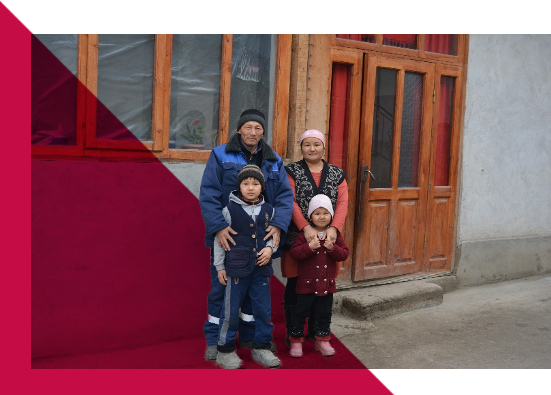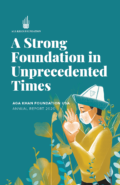Sowing
the Seeds
Annual Report 2020
Strengthening Food Security in the Kyrgyz Republic
Kanat and Gulmira Adybaev live near Osh, Kyrgyz Republic, with their two children. Like many people living in their village of Jylkeldi, they make their living by farming vegetables, including tomatoes, eggplants, potatoes, and carrots.
As young farmers, Kanat and Gulmira want to grow organic food to sell in the market. They also dream of seeing their children grow up with access to quality education.
As young farmers, Kanat and Gulmira want to grow organic food to sell in the market. They also dream of seeing their children grow up with access to quality education.
Farmers across the Kyrgyz Republic, including Kanat and Gulmira, were impacted by the COVID-19 pandemic and resulting lockdowns. Seeds were unavailable at the market because of the closed borders, which prevented almost 25% of farmers from starting the planting season on time.
In the southern region of the Kyrgyz Republic, where Kanat and Gulmira live, the delay affected crops like fruit, vegetables, and grains.
When COVID-19 began affecting food supplies and access in the Kyrgyz Republic, Local Impact, a new partnership between AKF and USAID, worked with officials in the region to respond to the crisis.
AKF collaborated with local representatives of the Kyrgyz Republic’s Ministry of Labor and Social Development (MLSD) on a vulnerability mapping tool, which helped village leaders identify households that needed the most help. Working together, AKF and MLSD distributed food supplies and seeds provided by Local Impact to vulnerable families.
Since many famers were not able to plant grains during the spring planting season because of a lack of available seeds in March 2020, AKF supplied winter wheat seeds to help them recover their farming production and increase the food available to the community.
Kanat and Gulmira’s family was among the 874 households in their region to receive 167 kilograms of winter wheat seeds. AKF also connected the farmers to an agronomist, who shared information with farmers about planting techniques and yield optimization.
“We are expecting a good harvest for wheat in early spring,” Kanat shared.
Kanat estimates that he and his family will harvest a minimum of four to five metric tons of wheat in May 2021. He is planning to sell three tons of wheat for $1,000 US (75,000 Kyrgyzstani soms),” and keep the rest to feed his family.
“We are expecting a good harvest for wheat in early spring.”

ABOVE: Farmers Kanat and Gulmira Adybaev with their children.
With the income from the sale of the wheat, Kanat and Gulmira can invest in their children’s education, buy vegetable seeds for the summer harvest, and rent additional land to increase their planting area. By growing wheat in the winter, they and other farmers in the region are also strengthening the food supply in the Kyrgyz Republic.
In addition to preserving livelihoods and food security during the COVID-19 pandemic, Local Impact worked with the Government of the Kyrgyz Republic to raise public awareness of how to reduce the spread of the coronavirus. This included creating a national media campaign to share information about COVID-19, and equipping Village Health Committees with Internet connectivity to keep communities informed of emerging coronavirus guidelines. Through Local Impact, AKF also helped train doctors and caregivers on how to support emotional and physical well-being for children and youth during the pandemic.
By growing wheat in the winter, they and other farmers in the region are also strengthening the food supply in the Kyrgyz Republic.
